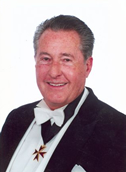 David Whitwell is a graduate ("with distinction") of the University of Michigan and the Catholic University of America, Washington D.C. (Ph.D., Musicology, Distinguished Alumni Award, 2000) and has studied conducting with Eugene Ormandy and at the Akademie fur Musik, Vienna. Prior to coming to Northridge, Dr. Whitwell participated in concerts throughout the United States and Asia as Associate First Horn in the USAF Band and Orchestra in Washington, D.C., and in recitals throughout South America in cooperation with the United States State Department.
David Whitwell is a graduate ("with distinction") of the University of Michigan and the Catholic University of America, Washington D.C. (Ph.D., Musicology, Distinguished Alumni Award, 2000) and has studied conducting with Eugene Ormandy and at the Akademie fur Musik, Vienna. Prior to coming to Northridge, Dr. Whitwell participated in concerts throughout the United States and Asia as Associate First Horn in the USAF Band and Orchestra in Washington, D.C., and in recitals throughout South America in cooperation with the United States State Department.
At the California State University, Northridge, which is in Los Angeles, Dr. Whitwell developed the CSUN Wind Ensemble into an ensemble of international reputation, with international tours to Europe in 1981 and 1989 and to Japan in 1984. The CSUN Wind Ensemble has made professional studio recordings for BBC (London), the Koln Westdeutscher Rundfunk (Germany), NOS National Radio (The Netherlands), Zurich Radio (Switzerland), the Television Broadcasting System (Japan) as well as for the United States State Department for broadcast on its "Voice of America" program. The CSUN Wind Ensemble’s recording with the Mirecourt Trio in 1982 was named the "Record of the Year" by The Village Voice. Composers who have guest conducted Whitwell’s ensembles include Aaron Copland, Ernest Krenek, Alan Hovhaness, Morton Gould, Karel Husa, Frank Erickson and Vaclav Nelhybel.
Dr. Whitwell has been a guest professor in 100 different universities and conservatories throughout the United States and in 23 foreign countries (most recently in China, in an elite school housed in the Forbidden City). Guest conducting experiences have included the Philadelphia Orchestra, Seattle Symphony Orchestra, the Czech Radio Orchestras of Brno and Bratislava, The National Youth Orchestra of Israel, as well as resident wind ensembles in Russia, Israel, Austria, Switzerland, Germany, England, Wales, The Netherlands, Portugal, Peru, Korea, Japan, Taiwan, Canada and the United States.
He is a past president of the College Band Directors National Association, a member of the Prasidium of the International Society for the Promotion of Band Music, and was a member of the founding board of directors of the World Association for Symphonic Bands and Ensembles (WASBE). In 1964 he was made an honorary life member of Kappa Kappa Psi, a national professional music fraternity. In September, 2001, he was a delegate to the UNESCO Conference on Global Music in Tokyo. He has been knighted by sovereign organizations in France, Portugal and Scotland and has been awarded the gold medal of Kerkrade, The Netherlands, and the silver medal of Wangen, Germany, the highest honor given wind conductors in the United States, the medal of the Academy of Wind and Percussion Arts (National Band Association) and the highest honor given wind conductors in Austria, the gold medal of the Austrian Band Association. He is a member of the Hall of Fame of the California Music Educators Association.
Dr. Whitwell's publications include more than 146 articles on wind literature including publications in Music and Letters (London), the London Musical Times, the Mozart-Jahrbuch (Salzburg), and 51 books, among which is his 13-volume History and Literature of the Wind Band Ensemble and an 8-volume series on Aesthetics in Music. In addition to numerous modern editions of early wind band music his original compositions include 5 symphonies.
David Whitwell was named as one of six men who have determined the course of American bands during the second half of the 20th century, in the definitive history, The Twentieth Century American Wind Band (Meredith Music).
A doctoral dissertation by German Gonzales (2007, Arizona State University) is dedicated to the life and conducting career of David Whitwell through the year 1977. David Whitwell is one of nine men described by Paula A. Crider in The Conductor's Legacy (Chicago: GIA, 2010) as "the legendary conductors" of the 20th century.
"I can’t imagine the 2nd half of the 20th century -- without David Whitwell and what he has given to all of the rest of us." Frederick Fennell (1993)
< Back to Home Page
